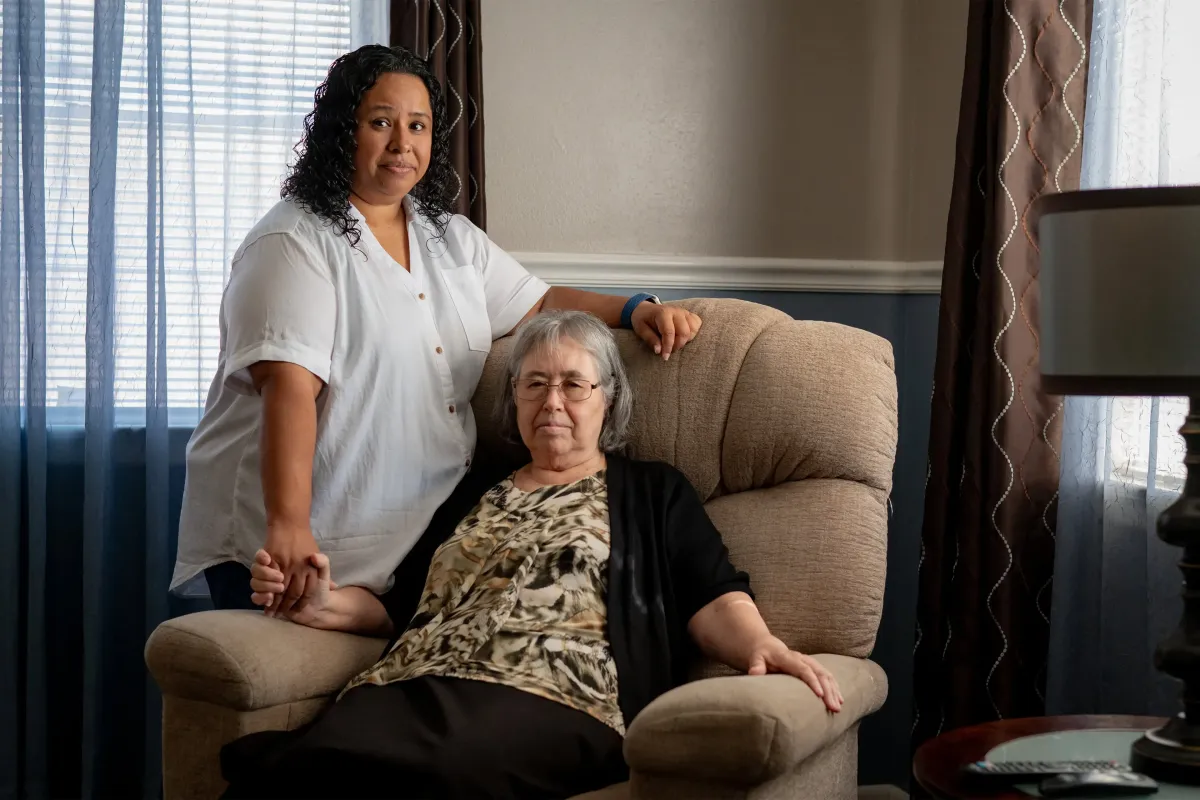Where to Begin When Caregiving Feels Like Too Much
You’re a Caregiver
(Even If No One Told You Yet)
Caregiving isn’t just hands-on support.
If you’re managing appointments, asking the doctor questions, coordinating help, paying bills, or even just lying awake at night worrying about what comes next, you’re caregiving even if you live far away. Even if you “just check in” over the phone. Even if you feel like you’re not doing enough.
Your presence, your voice, and your effort matter more than you know.
Here at The Aging Society, we help you step confidently into that role with tools, clarity, and the right words, so you can honor your loved one, protect your own well-being, and avoid the spiral of “what ifs.”
A Story That Might Feel Familiar
Emily sat in her car outside her mom’s house, hands still on the wheel, heart pounding.
Her mom had left the stove on again, this time with a dish towel too close to the flame. Nothing happened, but it shook her.
She knew things had to change. But when she brought it up over Sunday dinner, her brother rolled his eyes: “She’s fine.” Her sister changed the subject.
Now Emily was stuck in the middle, carrying her mom’s safety, her siblings’ denial, and her own fears.
What kind of care did her mom need? Could they afford it? And how could she convince her family without another fight?
If you’ve felt that weight, you’re not alone, and you don’t have to carry it by yourself anymore.
Start With Something Small:
One Small Shift
Start With Something Small: One Small Shift.
A simple daily email that makes caregiving feel lighter, starting today. Caring for an aging parent can feel like you’re juggling a hundred decisions at once, while still trying to keep the peace, protect your loved one’s dignity, and hold your own life together.
✅ A short story you’ll recognize from your own life
✅ One tool, script, or mindset shift that made life easier for another caregiver
✅ A small action you can take right now to make things lighter
It’s not theory, it’s what’s actually worked for hundreds of families. It’s short. It’s doable. And it’s the quickest way to start feeling less alone.
Everyone Carries Caregiving Differently
Some carry it all silently and never ask for help.
Some are tired of being the only one doing anything.
Some of us research everything before we make a move.
And some plan everything, then collapse when it all falls on them.
No matter how caregiving shows up in your life, there’s a place for you here.
You Are Here
Find The Path That Feels Right For You
For the Ones Who Need to Get It Right
Thoughtful tools for when the stakes feel high.
For the Ones Who Carry It All Quietly
Gentle support and scripts when only you notice.
For the Ones Who Are Tired of Doing It Alone
Real talk and relief when caregiving has become solo
For the Over-Responsible Ones
Practical systems and relief when burnout is looming.
Visit the Resource Center (All Access)
This isn’t just a collection of links. It’s a support system, designed to help you move forward with confidence, one decision at a time.
I was drowning in Google searches and family group texts going nowhere. The Aging Society helped me figure out not only what my mom needed, but how to get my siblings to listen. I wish I had found this sooner".
"Every other site overwhelmed me with too much information. This felt like someone walking beside me with calm, clarity, and a plan. The guides are gold, but the family tools? Life changing."
"This isn’t just a website. It’s a lifeline. From decision checklists to sibling support, it’s helped me feel less alone and more capable in every step of this journey.."
"I didn’t even realize I was a caregiver until I took the first quiz. Suddenly everything made sense, and I knew where to start. It was the first time I felt less alone in this whole process."
"Before finding this, I was drowning in group texts with my siblings and endless online searches. Now I have a plan, the right words to start conversations, and the confidence to take the next step."
"The tools here don’t just give you information—they make it feel doable. From the match guide to the family scripts, I finally feel like I can handle what’s ahead without losing myself in the process."
See Our Latest Blog Posts
Stay up to date with fresh insights and helpful tips in our latest blogs.
Whether you’re looking for guidance, real-life strategies, or just a little encouragement along the way,
our blog is here to give you practical support you can actually use.

When Your Parent Refuses Help: Gentle Ways to Build Trust and Connection
💡 Caregiver Aha! Moment:
You may feel invisible, but you’re not. Not here.
When your parent refuses help, it’s not just about the task; it’s about what they’re afraid of losing.
The Moment You’ve Lived Through
You offer to help. Maybe it’s with bathing, getting to an appointment, or managing medication.
Your mom snaps back:
“I don’t need help. Stop treating me like I’m helpless.”
Your heart sinks. You were trying to care for her, and somehow it turned into conflict.
You back off, frustrated and confused. Later, guilt creeps in. You wonder if you pushed too hard or gave up too soon.
What’s Really Going On Underneath
When aging parents resist help, it’s rarely about the help itself. It’s about:
Fear of losing independence
Pride in what they can still do
Shame around needing care
Anxiety about becoming a burden
For them, accepting help can feel like admitting defeat. For you, it can feel like a door slammed shut.
Recognizing these emotions is the first step to changing the dynamic.
Why Most Conversations Go Wrong
When emotions run high, we often default to reactions that escalate tension:
Arguing with logic:
“But you need help, look what happened last time.”Taking over:
“Fine, I’ll just do it myself.”Avoiding the topic:
Waiting until a crisis forces the issue.
These responses are natural, but they unintentionally reinforce resistance.
How to Respond with Love (and Still Make Progress)
The goal isn’t to win an argument, it’s to create safety in the conversation.
Here are gentle scripts you can try the next time you hear, “I don’t need help.”
Validate First
“Mom, I know you’re capable. I’m not trying to take over, I just want to make things easier for you.”Ask Instead of Tell
“What part feels hardest about letting me help?”
(Then listen. Truly listen.)Offer Choices, Not Ultimatums
“You don’t have to let me do everything. What’s one thing you’d be okay with me helping on?”
Steps Forward
Pause before reacting. Let the tension breathe.
Validate their autonomy. Use words that honor their independence.
Start small. Agree on one area of support before pushing for more.
These small shifts build trust, and trust opens the door for bigger help later.
💬 Caregiver Quote to Remember:
“The strongest relationships aren’t built on doing everything, they’re built on doing the right things together.”
When the Conversation Still Feels Hard
If these talks leave you walking on eggshells, you’re not alone. You don’t have to figure out what to say by trial and error.
The Conversation Clarity Report gives you:
Scripts tailored to your exact situation
A guided plan to lower tension
Confidence that you’re saying the right thing at the right time
FAQs About When a Parent Refuses Help
Why does my parent get angry when I offer help?
Anger is often a mask for fear or frustration. Your parent may feel their independence is slipping away, and anger becomes a way to protect their sense of control.
How can I encourage help without pushing too hard?
Start small. Offer assistance in one area they feel comfortable with and build from there. Use language that respects their autonomy.
What if my parent’s refusal puts them at risk?
Safety comes first. If they are in immediate danger, step in as needed. For ongoing concerns, involve their doctor or a neutral third party to help guide decisions.
Should I get professional support for these conversations?
Yes, sometimes an outside perspective helps. Consider consulting a senior care planner or a family therapist who specializes in aging dynamics.
Where to Find More Support
While you’re learning to navigate this season, here are a few resources to keep in your pocket:
The Aging Society Resource Center – Free and low-cost tools for every stage of senior care.
Follow on Pinterest – Daily tips to approach senior care with clarity and calm.
💌 Want more bite-sized tips?
Sign up for Family Matters, my weekly newsletter packed with quick, practical guidance to help you feel more supported in this journey.
Recommended Product:
🎯 Amazon Pick: Weekly Pill Organizer – A simple yet empowering way for your parent to manage their medications while maintaining independence.
💡 You may feel invisible, but you’re not. Not here. Not now. Not ever.
© 2025 The Aging Society. All rights reserved.
For families navigating senior care, find clarity, compassionate support, and trusted resources for senior care.
It all starts with One Small Shift.
